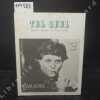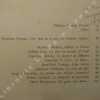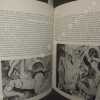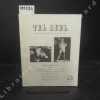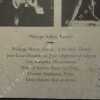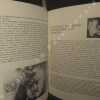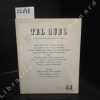-
Type
Autograph (11)
Book (52136)
Magazine (396)
Manuscript (2)
Maps (2)
New book (1)
Old papers (1)
Photographs (1)
Posters (2)
-
Latest
Last 24h (33)
Last 3 days (30)
Last month (574)
Last week (124)
-
Language
Dutch (1)
English (23)
French (52465)
German (12)
Greek (1)
Italian (18)
Japanese (2)
Latin (18)
Polish (1)
Portuguese (3)
Russian (1)
Spanish (5)
Swedish (2)
-
Century
16th (62)
17th (194)
18th (1151)
19th (3526)
20th (21525)
21st (3230)
-
Countries
Belgium (6949)
Canada (6)
China (2)
Côte d'Ivoire (45)
Denmark (847)
France (40502)
Germany (4)
Greece (3)
Italy (341)
Netherlands (95)
Switzerland (3758)
-
Syndicate
ALAC (6)
CLAM (1)
CNE (4)
ILAB (22321)
NVVA (1290)
SLACES (1195)
SLAM (19836)
SNCAO (42)
5 volumes des ‘cahiers’ ens. 1: Construire la terre / 2: Réflexions sur le bonheur / 4: La parole attendue / 6: Le Dieu de l’évolution + Introduction a la pensée de T. de Ch.
du Seuil, 1958, in-8vo, ca 150 p. par volume, brochures originales.

(SLACES, NVVA)
Phone number : 41 (0)26 3223808
Pierre TEILHARD DE CHARDIN et la POLITIQUE AFRICAINE. Suivi d'inédits (Sauvons l'humanité - L'art dans la ligne de l'énergie humaine).
Paris, Le Seuil (Cahiers Pierre Teilhard de Chardin, n°3), 1962, in 8° broché, 103 pages.
...................... Photos sur demande ..........................


Phone number : 04 77 32 63 69
Introduction à la pensée de Teilhard de Chardin.
1956 P., Le Seuil, 1956, petit in 8° broché, 131 pages.
...................... Photos sur demande ..........................


Phone number : 04 77 32 63 69
Pierre Teilhard de Chardin, naissance et avenir de l'homme
Paris, Editions du Rocher, 1987. in-8°, 330 pp., broche, couv. illustree.
Bon etat [SC-2] Contributions de (e.a.) : M. BRION - J. GUITTON - H. DE MONFREID - J. PIVETEAU
Introduction a la Pensee de Teilhard de Chardin.
Paris, Editions du Seuil, 1963. in-8°, 131 pp., broche, couv.
Bon etat [109B-7] .
AMOUR ET PURETE - Essai Sur Une Morale De La Signification
Paris Presses Universitaires de France 1947 In-8 Broché Bon
Titre imprimé en noir et rouge, couverture légèrement défraichie ; 250pp ; intérieur frais, un scotch masque une petite déchirure page 19-20
COMMUNAUTE DE TRAVAIL - L'expérience Révolutionnaire De Marcel BARBU
Paris Presses Universitaires de France 1949 In-8 Broché Moyen
Titre imprimé en noir et rouge, couverture défraichie, taché avec un léger manque à un angle ; 202pp ; intérieur frais, non coupé, mais un peu jauni ; 3 parties : I. Des principes au schéma - II. De l'expérience à la structure - III. Perspectives communautaires
PETIT TRAITE DE L'AMOUR DE SOI
P. Carrère, Rodez. Non daté. In-12. Broché. Etat d'usage, Couv. légèrement passée, Coiffe en pied abîmée, Intérieur acceptable. 161 pages. Etiquette de code sur le dos. Annotation en page de titre. Pages légèrement jaunies.. . . . Classification Dewey : 100-PHILOSOPHIE ET DISCIPLINES CONNEXES
Moi et les choses. Moi et les autres. Moi et elle... Classification Dewey : 100-PHILOSOPHIE ET DISCIPLINES CONNEXES
"La Pensée, revue du rationalisme moderne (arts, sciences, philosophie); Nouvelle série, N° 3 : avril-mai-juin, 1945."
Paris, La Pensée, 1945. 19 x 28, 128 pp., broché, bon état.
Hommage à Georges Politzer, Jacques Salomon et Jacques Decour, par Louis Aragon, Georges Cogniot, Paul Eluard et Pierre Daix.
"La Pensée, revue du rationalisme moderne (arts, sciences, philosophie); Nouvelle série, N° 2 : janvier-février-mars, 1945."
Paris, La Pensée, 1945. 19 x 28, 128 pp., broché, bon état.
LA MISSION DE L EGLISE
DESCLEE. 1985. In-8. Broché. Bon état, Couv. convenable, Dos satisfaisant, Intérieur frais. 241 pages.. . . . Classification Dewey : 210-Philosophie et théorie
Classification Dewey : 210-Philosophie et théorie
LA PETITE PIERRE DE CHINE
ACTES SUD JUNIOR / LES CONTES PHILOSOPHIQUES. 2004. In-12. Broché. Bon état, Couv. convenable, Dos satisfaisant, Intérieur frais. 47 pages augmentées de nombreuses illustrations en couleur in et hors textes - couverture contrepliée. . . . Classification Dewey : 190-Philosophie occidentale moderne
ILLUSTRATIONS DE CHEN JIANG HONG Classification Dewey : 190-Philosophie occidentale moderne
Une vie de toutes les couleurs
Actes Sud Junior Les contes philosophiques Broché 1998 In-12 (10 x 19 cm), broché avec rabats, couverture illustrée en couleurs, 47 pages, illustrations en couleurs in et hors-texte ; coiffes à peine frottés, très bel état général. Livraison a domicile (La Poste) ou en Mondial Relay sur simple demande.
Les démêlés de J.-J. Rousseau avec l'Archevêque de Beaumont et le Consistoire de Genève.
Bruxelles, Les Conférences du Foyer, La Nouvelle Réformation, 1922. 14 x 22, 19 pp., broché, état moyen (couverture défraîchie).
Faut-il brûler Teilhard de Chardin ?
Paris, Calmann-Lévy (« Questions dActualité »), 1959. in-12, 198 pages, bibliogr., broche, couv.
Bel exemplaire. [HI-2]
Télérama hors-série et l'Actualité religieuse : Le XXIe siècle sera-t-il religieux? Les dix tendances du spirituel pour l'an 2000.
Couverture souple. Revue 23 x 30 cm. 98 pages.
Livre. Télérama, 1998.
Télérama hors-série : Camus, le dernier des justes.
Couverture souple. Revue 23 x 30 cm. 98 pages.
Livre. Télérama, 2001.
De Mari, Liber Unicus. Ad Illustriss. Ferdinandum Carrasam Soriani Comitem. - [PAVING THE WAY FOR EMPIRICISM]
Napoli, Apud Iosephum Cacchium, 1570. 4to. Bound in 18th century marbled boards. Completely fresh and clean copy. Two small marginal holes to last two leaves, far from affecting text. Good, wide margins. Telesio's woodcut title-device (a beatiful naked woman, all alone, far from the troubles of the world, illuminated by the sun, surrounded by a border carrying the saying in Greek: ""mona moi fila"" - presumably depicting the goddess of Truth), and 11 lovely, illustrated woodcut initials. 12 ff.
The rare first edition of one of Telesio's smaller scientific treatises, his treatise on the sea, which was based on purely empirical knowledge. The work constitutes a corrective to Aristotle and a continuation of his magnum opus on the things of nature, the important second edition of which was printed in the same year, also by Cacchium. The empiricism that Telesio propounds in his novel, empirically based scientific treatises, like the ""De Mare"", caused him to be to be considered ""the first of the moderns"" (Francis Bacon),""Bernardino Telesio (1509-1588) belongs to a group of independent philosophers of the late Renaissance who left the universities in order to develop philosophical and scientific ideas beyond the restrictions of the Aristotelian-scholastic tradition. Authors in the early modern period referred to these philosophers as 'novateurs' and 'modern'. In contrast to his successors Patrizzi and Campanella, Telesio was a fervent critic of metaphysics and insisted on a purely empiricist approach in natural philosophy-he thus became a forerunner of early modern empiricism. He had a remarkable influence on Tommaso Campanella, Giordano Bruno, Pierre Gassendi, Francis Bacon, Thomas Hobbes and authors of the clandestine Enlightenment like Guillaume Lamy and Giulio Cesare Vanini."" (SEP).Telesio was born in Cosenza ""and in a sense he opens the long line of philosophers through which the South of Italy has asserted its Greek heritage, a line that links him with Bruno and Campanella, with Vico in the eighteenth century, and with Croce and Gentile in our own time."" (Kristeller, Eight Philosophers, p. 97). He was educated by his uncle, the humanist Antonio Telesio, in Milan and Rome, and he studied philosophy and mathematics at the university of Padua, where he got his doctorate in 1535. He had a great respect for the famous Aristotelian Vicenzo Maggi, with whom he discussed his magnum opus, obtaining his approval before publishing the seminal second version of it in 1570. He was closely connected not only with Maggi, but also with the other leaders of the most intelligent and official Aristotelianism of his age. But Telesio opposes the Aristotelianism of both his own and earlier times, claiming that they all erected arbitrary systems that consisted of a strange mixture of reason and experience. They created their systems without consulting nature, and thus they merely obtained arbitrary ideas of the world. What separates Telesio and his contemporaries from the great Renaissance thinkers that had gone ahead is not merely the passing of a few decades, but the emergence of a completely different intellectual atmosphere. ""The tradition of medieval thought, which was still felt very strongly in the fifteenth century and even at the beginning of the sixteenth, began to recede into the more distant background, and it was now the tbroad thought and learning of the early Renaissance itself which constituted the tradition by which the new generations of thinkers were shaped, and against which their immediate reactions were directed."" (Kristeller, Eight Philosophers, p. 91). Telesio belongs to a group of thinkers that we call the Renaissance philosophers of nature. They are considered a group by themselves, different from the humanists, Platonists, and Aristotelians that we usually group other Renaissance thinkers into. What distinguished these philosophers of nature, however, was not a different subject matter from that of the Aristotelians and the Platonists (of both contemporary and earlier times), but their clear claim to explore the principles of nature in an original and independent way, tearing themselves loose of an established tradition and authority that kept them in binds. They formulated novel theories andfreed themselves from the ancient philosophical authorities, especially Aristotle, who had dominated philosophical speculation, not least natural philosophy, for centuries. Telesio, of course, did not stand alone in this group of bold, original thinkers that we call the Renaissance philosophers of nature, and whose quest it was to make new discoveries and to attain knowledge unaccessible to the ancients, it also included for instance Fracastoro, Cardano, Paracelsus, and Bruno. But Telesio in particular protrudes, as his thought is distinguished by such clarity and coherence, and his ideas anticipate important aspects of later philosophy and science. ""Telesio dedicated his whole life to establishing a new kind of natural philosophy, which can be described as an early defense of empiricism bound together with a rigorous criticism of Aristotelian natural philosophy and Galenic physiology. Telesio blamed both Aristotle and Galen for relying on elaborate reasoning rather than sense perception and empirical research. His fervent attacks against the greatest authorities of the Western philosophical and medical traditions led Francis Bacon to speak of him as ""the first of the moderns"" (Opera omnia vol. III, 1963, p. 114). He was perhaps the most strident critic of metaphysics in late Renaissance times. It was obviously due to his excellent relationships with popes and clerics that he was not persecuted and was able during his own lifetime to publish his rather heterodox writings, which went on the index shortly after his death."" (SEP).""Giordano Bruno speaks of the ""giudiciosissimo Telesio"" in the third dialog of ""De la causa"", whilst Francis Bacon based his own speculative philosophy of nature on a blend of Telesian and Paracelsian conceptions (Giachetti Assenza 1980" Rees 1977 1984). Thomas Hobbes followed Telesio in the rejection of species (Schuhmann 1990" Leijenhorst 1998, p. 116ff.) The physiology of René Descartes in ""De homine"" shows close similarities to Telesio's physiological theories as they are presented in ""De natura rerum"" (Hatfield 1992). Telesio also had some influence on Gassendi and on libertine thinkers (Bianchi 1992)."" (SEP).Adams: T:291.
De Rerum Natura iuxta propria principia, Liber Primus, & Secundus, denuò editi. - [THE MANIFESTO OF NATURAL PHILOSOPHY - DEFINING ""SPACE"" FOR THE FIRST TIME PROPER]
Napoli, Apud Iosephum Cacchium, 1570. 4to. Contemporary limp vellum with handwritten title to spine. Remains of old paper-labels to top and bottom of spine. Spine with loss of ab. 3x2 cm. of vellum to middle, not affecting the book block, which is sound and fine underneath. Some soiling to binding, but all in all fine and unrestored, albeit a bit loose. Some brownspotting to title-page (not heavy), otherwise just a bit of scattered brownspotting. All in all internally very nice and clean, and with good, wide margins. Old owner's name (Juliani Riccii) to front free end-paper and title-page, which also has his inventory number in neat hand: ""no/ 634""). Telesio's woodcut title-device (a beatiful naked woman, all alone, far from the troubles of the world, illuminated by the sun, surrounded by a border carrying the saying in Greek: ""mona moi fila"" - presumably depicting the goddess of Truth), and numerous lovely, illustrated woodcut initials throughout. 95 ff.
The rare and important first edition thus, being the much enlarged (by treatises on specific questions of natural philosophy) and revised second edition and the first edition under the canonical title ""De Rerum Natura"" (clearly referring to Lucretius's great work), of Telesio's revolutionizing main work, which established a new kind of natural philosophy and earned him the reputation as ""the first of the moderns"" (Francis Bacon). The work is a manifesto for natural philosophy emancipated from peripatetic rationalism, expressed clearly in the subtitle to the first book of the work: ""the structure of the world and the nature and magnitude of bodies contained in itare not to be sought from reason, as the ancients did"" they must be perceived from sensation and treated as being things themselves."" (translation of the Latin of the present work, p. 2). ""Taken as a whole, the book is a frontal assault on the foundations of Peripatetic philosophy accompanied by a proposal for replacing Aristotelianism with a system more faithful to nature and experience."" (Copenhaver & Schmitt, p. 311). Telesio's ""De Rerum Natuna"" constitutes one of the first serious attempts to replace Aristotle's natural philosophy, and his seminal, novel theory of space and time anticipates Newton's absolute time and absolute space. It furthermore even seems that it is in the present work that the word ""space"" (""spatium"") is used for the first time to determine what we now mean by space - thus Telesio has here created an entirely new terminology for one of the single most important phenomenons within physics, astronomy, philosophy, etc., giving to it a terminological precision that is unprecedented and which has influenced the entire history of science and philosophy. ""[i]n some of his characteristoc theories, Telesio appears as a direct or indirect forerunner of Newton and Locke."" (Kristeller, Eight Philosophers, p. 107). ""Bernardino Telesio (1509-1588) belongs to a group of independent philosophers of the late Renaissance who left the universities in order to develop philosophical and scientific ideas beyond the restrictions of the Aristotelian-scholastic tradition. Authors in the early modern period referred to these philosophers as 'novateurs' and'modern'. In contrast to his successors Patrizzi and Campanella, Telesio was a fervent critic of metaphysics and insisted on a purely empiricist approach in natural philosophy-he thus became a forerunner of early modern empiricism. He had a remarkable influence on Tommaso Campanella, Giordano Bruno, Pierre Gassendi, Francis Bacon, Thomas Hobbes and authors of the clandestine Enlightenment like Guillaume Lamy and Giulio Cesare Vanini."" (SEP).Telesio was born in Cosenza ""and in a sense he opens the long line of philosophers through which the South of Italy has asserted its Greek heritage, a line that links him with Bruno and Campanella, with Vico in the eighteenth century, and with Croce and Gentile in our own time."" (Kristeller, Eight Philosophers, p. 97). He was educated by his uncle, the humanist Antonio Telesio, in Milan and Rome, and he studied philosophy and mathematics at the university of Padua, where he got his doctorate in 1535. He had a great respect for the famous Aristotelian Vicenzo Maggi, with whom he discussed his magnum opus, obtaining his approval before publishing the seminal second version of it in 1570. He was closely connected not only with Maggi, but also with the other leaders of the most intelligent and official Aristotelianism of his age. But Telesio opposes the Aristotelianism of both his own and earlier times, claiming that they all erected arbitrary systems that consisted of a strange mixture of reason and experience. They created their systems without consulting nature, and thus they merely obtained arbitrary ideas of the world. What separates Telesio and his contemporaries from the great Renaissance thinkers that had gone ahead is not merely the passing of a few decades, but the emergence of a completely different intellectual atmosphere. ""The tradition of medieval thought, which was still felt very strongly in the fifteenth century and even at the beginning of the sixteenth, began to recede into the more distant background, and it was now the tbroad thought and learning of the early Renaissance itself which constituted the tradition by which the new generations of thinkers were shaped, and against which their immediate reactions were directed."" (Kristeller, Eight Philosophers, p. 91). Telesio belongs to a group of thinkers that we call the Renaissance philosophers of nature. They are considered a group by themselves, different from the humanists, Platonists, and Aristotelians that we usually group other Renaissance thinkers into. What distinguished these philosophers of nature, however, was not a different subject matter from that of the Aristotelians and the Platonists (of both contemporary and earlier times), but their clear claim to explore the principles of nature in an original and independent way, tearing themselves loose of an established tradition and authority that kept them in binds. They formulated novel theories andfreed themselves from the ancient philosophical authorities, especially Aristotle, who had dominated philosophical speculation, not least natural philosophy, for centuries. Telesio, of course, did not stand alone in this group of bold, original thinkers that we call the Renaissance philosophers of nature, and whose quest it was to make new discoveries and to attain knowledge unaccessible to the ancients, it also included for instance Fracastoro, Cardano, Paracelsus, and Bruno. But Telesio in particular protrudes, as his thought is distinguished by such clarity and coherence, and his ideas anticipate important aspects of later philosophy and science. His magnum opus, the extremely influential ""De Rerum Natura"", is that which by far best expresses his novel thoughts and that which most profoundly influenced the thought, philosophy, and science of the cnturies to come. ""[b]y 1547 his ideas seem to have been in public circulation, and within a few years he was at work on his first treatise ""On the Nature of Things According to Their Own Principles"", one of the more incisisve titles in Renaissance philosophy and a clear allusion to Lucretius. [...] Pressed by his followers, he published the original two book version of ""De rerum natura"" [the title of this being ""De Natura iuxta propria principia liber""] in 1563 [recte: 1565], having previously testing the soundness of his arguments in conversations with Vincenzo Maggi, a noted Paduan Peripatetic. Another edition followed in 1570" in 1575 Antonio Persio gave public lectures on the Telesian system in Venice, Padua, Bologna, and the south" and in 1586 appeared the definitive expansion to nine books. The author died two years later in Cosenza."" (Copenhaver & Schmitt, p. 310). In the preface to the work, Telesio rejects Aristotle's doctrine as being in conflict with the senses, with itself, and with the Scriptures, and he claims that his own doctrine is free from these defects. As we have seen above, in the introduction, or sub-title to the first book, he furthermore insists that unlike his predecessors, he has followed nothing but sense perception and nature. He then proceeds to expound the principles of his natural philosophy, positing heat and cold as the two active principles of all things, and matter as a third, passive, principle. Having developed and applied these principles, he concludes the first work with a very interesting treatment of space and time. After having set forth his own position, he examines and refutes the views of earlier philosophers, expecially those of Aristotle, whom he considers superior to all others. ""So far as Telesio's relation to Aristotle is concerned, we must admit that he shows considerable independence, both in his own theories and in his detailed criticism of Aristotle's views, and this independence is more valuable since it is based not on ignorance, but on a thorough knowledge of the Aristotelian writings, and is accompanied by a genuine respect for the relative merits of Aristotelianism."" (Eight Philosophers, pp. 101-2). The only sources apart from Aristotle that Telesio quotes at length are medical, i.e. Hippocrates and Galen, from which he got his notions of human physioglogy. He does, however, draw upon other sources, borrowing notions, though not quotiong them (e.g. Fracastoco, the Epicureans, the Stoics, the Neoplatonists, Ficino). ""These apparent borrowings from various sources should certainly not be overlooked, but one's final impression is that in transforming and combining these ideas, and in formulating some important new ones, Telesio was remarkably original. In his cosmology, the role assigned to heat, cold, and matter is chiefly of historical interest, since it is one of the first serious attempts to replace Aristotle's natual philosophy. We may give him credit, too, for apparently doing away with the sharp disinction between celestial and terrestrial phenomena, which was one of the chief weaknesses of the Aristotelian system. Of greater significance are his theories of the void, and of space and time. His assertion of an empty space was in a sense a return to the position of the ancient atomoists, which Aristotle had tried to refute"" this position must have been known to Telesio, from Lucretius and also from Aristotle himself, but the evidence on which he based himself was partly new and, so to speak, experimental.Still more important is his theory of space and time. Whereas Aristotle had defined time as the number or measure of motion, thus making it dependent on motion, Telesio regards time as independent of, and prior to, motion, like an empty spectacle. He thus moves a long step away from Aristotle in the direction of Newton's absolute time. In the case of space, the change in conception is even more interesting. The Greek term ""Topos"", which we often translate as space has the primary meaning of place, and Aristotle's theory that the ""topos"" of the contained body is the limit or border of its containing body makes much better sense when we translate ""topos"" as place rather than space. Telesio seems to be aware of this ambiguity, for he uses not only the term ""locus"", which had been the standard Latin translation of Aristotle's ""topos"", but also ""spatium"", which is much more appropriate for his notion of an empty space in which all bodies are contained. Thus he again moves away from Aristotle in the direction of Newton's absolute space"" but, more than this, I am tempted to believe that it was Telesio himself who gave terminological precision to the word ""spatium"" (space) and substituted it for ""locus"", a usage for which I do not know any earlier clear instances"". (Kristeller, Eight Philosophers, pp. 103-4).Telesio's theories and entire world-view proved to be extremely influential, and his is considered a forerunner - directly as well as indirectly - of not only Newton and Locke, but also Descartes and Bacon, and a strong direct influence on Bruno, Campanella, and Patrizi. ""Telesio dedicated his whole life to establishing a new kind of natural philosophy, which can be described as an early defense of empiricism bound together with a rigorous criticism of Aristotelian natural philosophy and Galenic physiology. Telesio blamed both Aristotle and Galen for relying on elaborate reasoning rather than sense perception and empirical research. His fervent attacks against the greatest authorities of the Western philosophical and medical traditions led Francis Bacon to speak of him as ""the first of the moderns"" (Opera omnia vol. III, 1963, p. 114). He was perhaps the most strident critic of metaphysics in late Renaissance times. It was obviously due to his excellent relationships with popes and clerics that he was not persecuted and was able during his own lifetime to publish his rather heterodox writings, which went on the index shortly after his death."" (SEP)""Giordano Bruno speaks of the ""giudiciosissimo Telesio"" in the third dialog of ""De la causa"", whilst Francis Bacon based his own speculative philosophy of nature on a blend of Telesian and Paracelsian conceptions (Giachetti Assenza 1980" Rees 1977 1984). Thomas Hobbes followed Telesio in the rejection of species (Schuhmann 1990" Leijenhorst 1998, p. 116ff.) The physiology of René Descartes in ""De homine"" shows close similarities to Telesio's physiological theories as they are presented in ""De natura rerum"" (Hatfield 1992). Telesio also had some influence on Gassendi and on libertine thinkers (Bianchi 1992)."" (SEP)""His sense of empirical science, which included progressive ideas on space, vacuum, and other physical topics, grew out of a disenchanted world-view remarkable for its hard-headed clarity."" (Copenhaver & Schmitt, p. 314). Adams: T:292"" Thorndyke: VI:370-71.Paul Oskar Kristeller: ""Eight Philosophers of the Italian Renaissance"", 1964"" ""Renaissance Thought and its Sources"", 1979.Eugenio Garin: ""Italian Humanism. Philosophy and Civic Life in the Renaissance, 1965Copenhaver & Schimtt: ""Renaissance Philosophy"", 1992. Ernst Cassirer: ""Individuum und Kosmos in der Philosophie der renaissance"", 1927.D.S.B. XIII:277-80. (""Telesio also introduced concepts of space and time that anticipated the absolute space and time of Newtonian physics"").
Jules Tellier. Ses oeuvres publiées par Raymond de la Tailhède.
Paris : Emile-Paul Frères, éditeurs, 1923. Deux volumes in-8°, brochés.
Tirage limité à 1175 exemplaires, celui-ci sur pur fil Lafuma. Couverture un peu poussiéreuse. [25233]
Essai d'esthétique bénédictine. Collection Lebègue.
Bruxelles, Office de Publicité, 1946. 13 x 20, 65 pp., quelques illustrations, broché, bon état.
Envoi de l'auteur.
Tel Quel - Littérature, Philosophie, Art, Science, Politique - Marcelin PLEYNET (Directeur Gérant)
Reference : 111583
(1981)
Tel Quel N° 87 : Paradis (Philippe SOLLERS) - Don Juan ou la promesse d'amour. Débat (Shoshana FELDMAN) - Matisse et Picasso (Marcelin PLEYNET) - La mort du Marquis de Sade (Gilbert LELY) - Le martyre de Sébastien (Jean-Luc HENNIG) - ...
1981 N° 87 - Printemps 1981 - Revue publiée avec de concours du Centre National des Lettres - In-8, broché - 104 pages - Quelques illustrations et reproductions photographiques en N&B
Assez bon état - Coins légèrement émoussés - Couverture piquée
Tel Quel - Littérature, Philosophie, Art, Science, Politique - Marcelin PLEYNET (Directeur Gérant)
Reference : 111584
(1981)
Tel Quel N° 89 : Paradis (Philippe SOLLERS) - Balzac, le 19e siècle, l'occulte (Philippe MURAY) - Joyce, littérature et religion (Jean-Louis HOUDEBINE) - Déracinements (Guy SCARPETTA) - Encore la Chine... (Bernard SICHERE) - Poèmes (Chowki ABDELAMIR) - Roue de torture (Denis BUICAN) - ...
1981 N° 89 - Automne 1981 - Revue publiée avec de concours du Centre National des Lettres - In-8, broché - 104 pages - Quelques illustrations et reproductions photographiques en N&B
Assez bon état - Coins légèrement émoussés - Couverture piquée
Tel Quel N° 44 : Propriétés des rectangles (Claude SIMON) - Matière, sens, dialectique (Julia KRISTEVA) - Lénine et la scène philosophique (Christine GLUCKSMANN) - Pour une matériologie (Jean-Louis BAUDRY) - Forme et évènement (I) (Jacqueline RISSET) - Le gardien de l'interprétation (Hubert DAMISCH) - L'entrée dans la baie...(Jean RISTAT) - Enseignement (Maurice LAUGAA) - Thèses générales (Philippe SOLLERS) - ...
1971 N° 44 - Hiver 1971 - Revue trimestrielle - In-8, broché - 104 pages
Bon état - Couverture ternie - Légers plis de lecture au dos - Petit accroc au dos
 Write to the booksellers
Write to the booksellers


![De Mari, Liber Unicus. Ad Illustriss. Ferdinandum Carrasam Soriani Comitem. - [PAVING THE WAY FOR EMPIRICISM]. "TELESIO, BERNARDINO [BERNARDINUS ...](https://static.livre-rare-book.com/pictures/LLX/46891_3_thumb.jpg)
![De Mari, Liber Unicus. Ad Illustriss. Ferdinandum Carrasam Soriani Comitem. - [PAVING THE WAY FOR EMPIRICISM]. "TELESIO, BERNARDINO [BERNARDINUS ...](https://static.livre-rare-book.com/pictures/LLX/46891_4_thumb.jpg)
